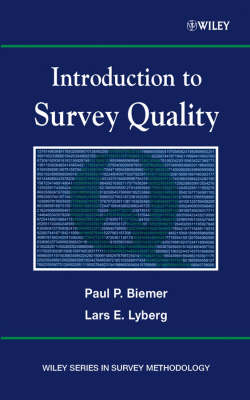Wiley Series in Survey Methodology
2 primary works • 5 total works
Book 335
Peruse the history of survey research and the essential concepts for data quality. With an emphasis on total survey error, the authors review principles and concepts in the field and examine important unresolved issues in survey methods. Spanning a range of topics dealing with the quality of data collected through the survey process, they focus on such key issues as: * Major sources of survey error, examining the origins of each error source most successful methods for reducing errors from those sources* Methods most often used in practice for evaluating the effects of the source on total survey error* Implications of improving survey quality for organizational management and costs
Book 556
Combining theoretical, methodological, and practical aspects, Latent Class Analysis of Survey Error successfully guides readers through the accurate interpretation of survey results for quality evaluation and improvement. This book is a comprehensive resource on the key statistical tools and techniques employed during the modeling and estimation of classification errors, featuring a special focus on both latent class analysis (LCA) techniques and models for categorical data from complex sample surveys. Drawing from his extensive experience in the field of survey methodology, the author examines early models for survey measurement error and identifies their similarities and differences as well as their strengths and weaknesses.
Subsequent chapters treat topics related to modeling, estimating, and reducing errors in surveys, including: Measurement error modeling forcategorical data The Hui-Walter model and othermethods for two indicators The EM algorithm and its role in latentclass model parameter estimation Latent class models for three ormore indicators Techniques for interpretation of modelparameter estimates Advanced topics in LCA, including sparse data, boundary values, unidentifiability, and local maxima Special considerations for analyzing datafrom clustered and unequal probability samples with nonresponse The current state of LCA and MLCA (multilevel latent class analysis), and an insightful discussion on areas for further research Throughout the book, more than 100 real-world examples describe the presented methods in detail, and readers are guided through the use of lEM software to replicate the presented analyses. Appendices supply a primer on categorical data analysis, and a related Web site houses the lEM software.
Extensively class-tested to ensure an accessible presentation, Latent Class Analysis of Survey Error is an excellent book for courses on measurement error and survey methodology at the graduate level. The book also serves as a valuable reference for researchers and practitioners working in business, government, and the social sciences who develop, implement, or evaluate surveys.
Subsequent chapters treat topics related to modeling, estimating, and reducing errors in surveys, including: Measurement error modeling forcategorical data The Hui-Walter model and othermethods for two indicators The EM algorithm and its role in latentclass model parameter estimation Latent class models for three ormore indicators Techniques for interpretation of modelparameter estimates Advanced topics in LCA, including sparse data, boundary values, unidentifiability, and local maxima Special considerations for analyzing datafrom clustered and unequal probability samples with nonresponse The current state of LCA and MLCA (multilevel latent class analysis), and an insightful discussion on areas for further research Throughout the book, more than 100 real-world examples describe the presented methods in detail, and readers are guided through the use of lEM software to replicate the presented analyses. Appendices supply a primer on categorical data analysis, and a related Web site houses the lEM software.
Extensively class-tested to ensure an accessible presentation, Latent Class Analysis of Survey Error is an excellent book for courses on measurement error and survey methodology at the graduate level. The book also serves as a valuable reference for researchers and practitioners working in business, government, and the social sciences who develop, implement, or evaluate surveys.
Survey Methods in Multicultural, Multinational, and Multiregional Contexts
by Janet A Harkness, Michael Braun, Brad Edwards, Timothy P Johnson, Lars E. Lyberg, Peter Ph Mohler, Beth-Ellen Pennell, and Tom Smith
Published 1 January 2010
Survey Quality presents a comprehensive treatment of all aspects of the survey process, from design to implementation to data processing and analysis. Using simple, non-technical language for statisticians, survey workers, and program administrators, the authors explain how to think about survey quality, how to measure it, and how to design and implement surveys to minimize total survey error while controlling costs. This second edition has been thoroughly updated to reflect the latest research and impact of technological advancements on survey design.

